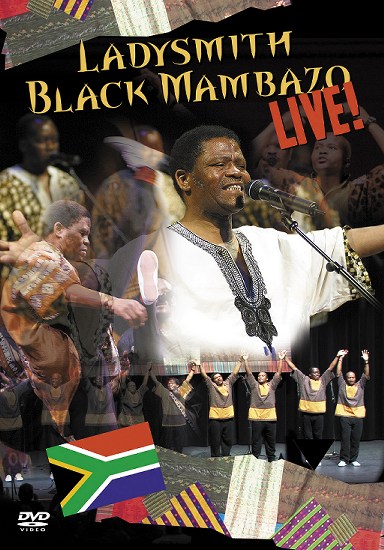

Ladysmith Black Mambazo became popular with Paul
Simon's album Graceland (1986). The song Homeless was
often released on numerous albums of this group. Ladysmith Black
Mambazo (The black axe from the town Ladysmith) was founded in 1964 by
Joseph Shabala. He is creator, writer, composer and the genius of the
group. He is still the spirit and leader of this vocal formation.
The DVD Ladysmith Black Mambazo LIVE! was
recorded in Akron, Ohio, in 2008. The DVD listed 10 songs and two
further songs as encore. All songs were composed by Joseph Shabala
with the exception of Homeless, which is a collaboration with
Paul Simon. Shosholoza and Amazing Grace are traditional
compositions.
The concert starts with Nomathemba, which
means in Zulu mother of hope. "I wrote Nomathemba in 1965
and it was the first song I ever composed after it came to me in a
dream", comments Joseph Shabala, founder, leader and musical director
of the group. It was the first hit single on their album Amabutho
(1973). Joseph's lithe alto coos and growls above two tenors and more
basses that make soothing, rhythmic textures punctuated by breathy
bursts is the typical vocal art of LBM.
The religious song This Is the Way We Do
was recorded for the album Ilembe: Honoring Shaka Zulu
(2008). Shabala's
conclusion: "Many people have asked us how we have had so much
success. This is the way we do it. We put our songs together to
worship God. If there’s something you want from this life, you have to
ask God to help show you the way of how to do it. If you want to be
successful at anything, you can only do it with the help of God.”
Long Walk To Freedom ("Halala South Africa")
is Joseph's contribution to the history of his homeland South Africa.
It was originally recorded on the album Lihl' Ixhiba Likagogo
(2000). Joseph explains: "It means "congratulations South Africa".
Many people were expecting war and we created peace, so when we sing
it we thank our leaders and our people. It was a long and difficult
road, but we made it."
Hello My Baby is from the album
Ezinkulu (1979) and later re-issued on the GRAMMY-awarded Shaka
Zulu (1987), produced by Paul Simon. This song was also published
on the album Long Walk To Freedom (2006). The style of LBM is
called Isicathamiya, a form of Zulu choral singing, sung by
mine-workers and typically bass-heavy.
Nginethemba is a song "to encourage people to come together and
solve their problems." (Shabala). Thulanhliziyo is a good
example for the showmanship of the group. They interactive with the
audience in a really entertaining way. Joking, dancing and singing.
Makoti from
the album Shintsha Sithothobala (1977) is announced as a
war-song. With wild gestures, jumps, whistling and other onomatopoeic
sounds the group is painting their vision.
Rain Rain
Beautiful Rain from Shaka Zulu (1987) is one of the rare
songs in English certainly composed under the influence of Paul Simon.
One highlight of the album Graceland was the song Homeless.
A must for every concert of Ladysmith Black Mambazo.
Wentomb'unecala
opens the stage for great solo jumps and gestures of the respective
members.
After long standing ovations one of the group members jumps onstage
and tells: "The guys told me you to say the show is finished." After
this joking interlude the group presents Shosholoza (Go Forward),
originally released on In Harmony (1999) and re-released on
Long Walk To Freedom (2006). Shosholoza is the name of a
popular traditional African song favored particularly by hard working
men whose work it was to lay railway lines.
The second encore
is a medley of Amazing Grace and Nearer By God To Thee.
Both are well-known hymns. The Paul Simon/Joseph Shabala
arrangement is a real incorporation of joy.
This CD is
Ladysmith Black Mambazo's invitation to visit their concerts. Pure fun
and entertainment with great chorus and wonderful harmonies.
